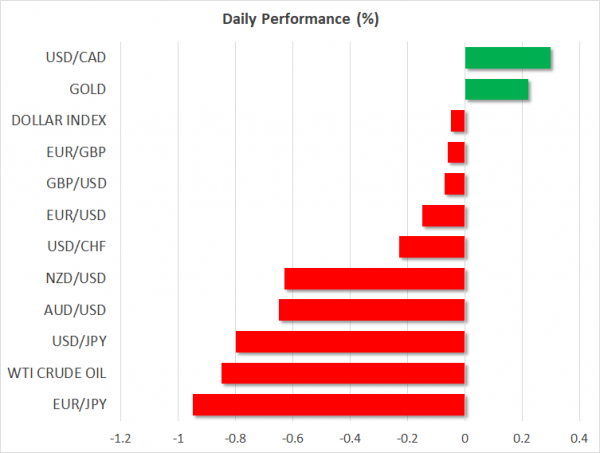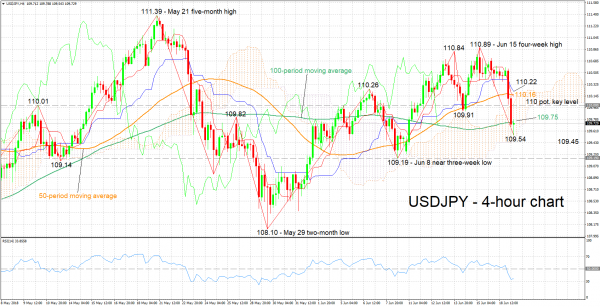Here are the latest developments in global markets:
FOREX: The US dollar index – which tracks the greenback’s performance against a basket of six major currencies – is lower on Tuesday, though by less than 0.1%. Meanwhile, the Japanese yen is 0.8% higher against the dollar and nearly 1.0% stronger versus the euro, as signs of further escalation in trade tensions between the world’s two largest economies are diverting flows into safe-haven assets.
STOCKS: US markets closed mostly lower on Monday, amid lingering concerns over a trade war. The Dow Jones and the S&P 500 fell by 0.41% and 0.21% respectively, while the Nasdaq Composite managed to rise, albeit only marginally. Futures tracking the Dow, S&P and Nasdaq 100 are currently flashing red and suggest these indices are likely to open sharply lower today, following reports overnight the US is considering another round of tariffs on China. Asian markets felt the heat, with Japan’s Nikkei 225 and Topix plunging by 1.77% and 1.55% correspondingly, while in Hong Kong, the Hang Seng dropped a whopping 3.1%. In Europe, futures tracking the major benchmarks suggest the carnage will continue, as all indices are expected to open more than 1.0% lower.
COMMODITIES: Oil prices rebounded on Monday, aided by reports that OPEC and associated producers may decide to raise their production by less than previously suggested at their upcoming meeting on Friday. However, both WTI and Brent gave back some of their gains on Tuesday, as the broader risk aversion in markets and the increasingly realistic prospect of a ‘trade war’ is clouding the outlook for oil demand. In precious metals, gold is 0.2% higher today, currently trading just above the $1,280/ounce mark. The risk-off environment is helping the metal post some gains, though the advance is still relatively small compared to the surge seen in other haven assets like the Japanese yen.
Major movers: Havens rally, stocks slump as risk aversion takes hold
Another wave of risk aversion hit markets on Tuesday, following reports the US may impose 10% tariffs on another $200bn in Chinese goods. The move likely caught investors by surprise, considering how recently the latest set of tariffs was announced, and that several participants probably anticipated some form of dialogue in the coming days, not immediate escalation. Trump said these tariffs will go into effect if China ‘insists on going forward with the new tariffs it recently announced’, adding the US will impose even further measures if the Asian nation retaliates again. China immediately responded it will ‘forcefully fight back’ with ‘qualitative’ and ‘quantitative’ measures.
In classic risk-off fashion, equity markets in Asia were a sea of red, while haven currencies like the Japanese yen soared overnight. Risk-sensitive currencies such as the aussie and kiwi also took a hit, both declining by 0.6% versus the greenback, with aussie/dollar tumbling to a one-year low. Even gold prices rose, albeit very modestly, once again showing a muted response to trade worries.
Clearly, the risk that the situation deteriorates further has risen meteorically, as the two sides are back into a tit-for-tat pattern. More importantly, it is becoming increasingly questionable whether the US moves are simply intended to generate leverage ahead of talks, or whether they are indeed the opening salvo in a ‘trade war’, as there are currently no signs of negotiations being in the pipelines. China is likely to announce fresh countermeasures of equal intensity – as it has done consistently thus far – likely keeping risk appetite suppressed for a while, and potentially diverting funds into haven assets to the detriment of riskier ones.
Elsewhere, politics are still in play in Europe. German Chancellor Merkel’s position is seen as being in jeopardy amid a domestic standoff on immigration policy. Her government’s interior Minister, Horst Seehofer, is leading a ‘rebellion’ to turn away immigrants if they have registered elsewhere in the EU. The situation is seen as weakening Merkel’s already-fragile standing, and is worth keeping a close eye on, as any signs that the pro-EU Chancellor may be replaced would likely spell bad news for the common currency.
Day ahead: US housing data due; US-China trade spat receives new chapter; ECB Forum also on the agenda
Tuesday’s calendar is relatively light in terms of economic releases, with some figures on housing out of the US attracting most interest. Generating more attention than data releases though, are trade developments, as well as the ECB Forum in Sintra, Portugal.
Krona pairs will be in focus as Sweden’s unemployment rate for May is made public at 0730 GMT.
May’s housing starts out of the US will be released at 1230 GMT. Analysts are projecting a 1.4% monthly increase in the number of starts during May, following a 3.7% decline in April. The number of building permits for May is due at the same time.
The outcome of the bi-weekly milk auction will be known later today – though there’s no specific time of release. Kiwi pairs will be generating attention as the data are made public; dairy products are New Zealand’s largest goods export earner, with higher prices seen as supporting the NZD.
On the trade front, the US-China spat received a new chapter after Trump threatened to push forward with an additional 10% tariff on $200 billion worth of Chinese goods imported into the US. China indicated that it plans to retaliate to such an action, whilst accusing the US of starting a trade war. Developments will be closely watched and have implications not just for currency markets, but also equity, fixed income and commodities.
In UK politics and Brexit-related, PM Theresa May suffered a defeat in the House of Lords on Monday which opens the way for another vote in the House of Commons and a likely confrontation with pro-EU ‘fellow’ Conservatives over her Brexit plans.
The ECB Forum on Central Banking in Sintra, Portugal will continue through Wednesday and features speeches from influential policymakers who can move markets with their comments. ECB President Mario Draghi (0800 GMT), ECB chief economist Peter Praet (0830 GMT and 1100 GMT) and St. Louis Fed President James Bullard (1100 GMT – non-voting FOMC member in 2018) will be among those delivering remarks today at the venue. Meanwhile, ECB Member of the Supervisory Board Pentti Hakkarainen will be speaking in Frankfurt at 1015 GMT.
In energy markets, API data on US crude stocks are due at 2030 GMT.
Technical Analysis: USDJPY negative in the short-term as it hits 8-day low
USDJPY recorded losses after touching a four-week high of 110.89 on Friday. Earlier on Tuesday, the pair posted an eight-day low of 109.54. The negatively aligned Tenkan- and Kijun-sen lines, as well as the declining RSI are pointing to a bearish short-term picture for the pair.
Further escalation of trade tensions between the US and China is likely to divert safe-haven flows into the yen, pushing USDJPY further down. Immediate support could come around the Ichimoku cloud bottom at 109.45. The region around the near three-week low of 109.19 from June 8 – including the 109 handle – would be eyed next in the event of steeper declines.
An easing of tensions is expected to boost the pair. Resistance seems to be taking place around the current level of the 100-period moving average at 109.75. The area around the 110 round figure, which also encapsulates the 50-period MA (110.16), Ichimoku cloud top (110.14), Tenkan-sen (110.14) and Kijun-sen (110.22), could act as an additional barrier further above before the attention shifts to last week’s four-week high of 110.89.
US releases later in the day can also move the pair.



